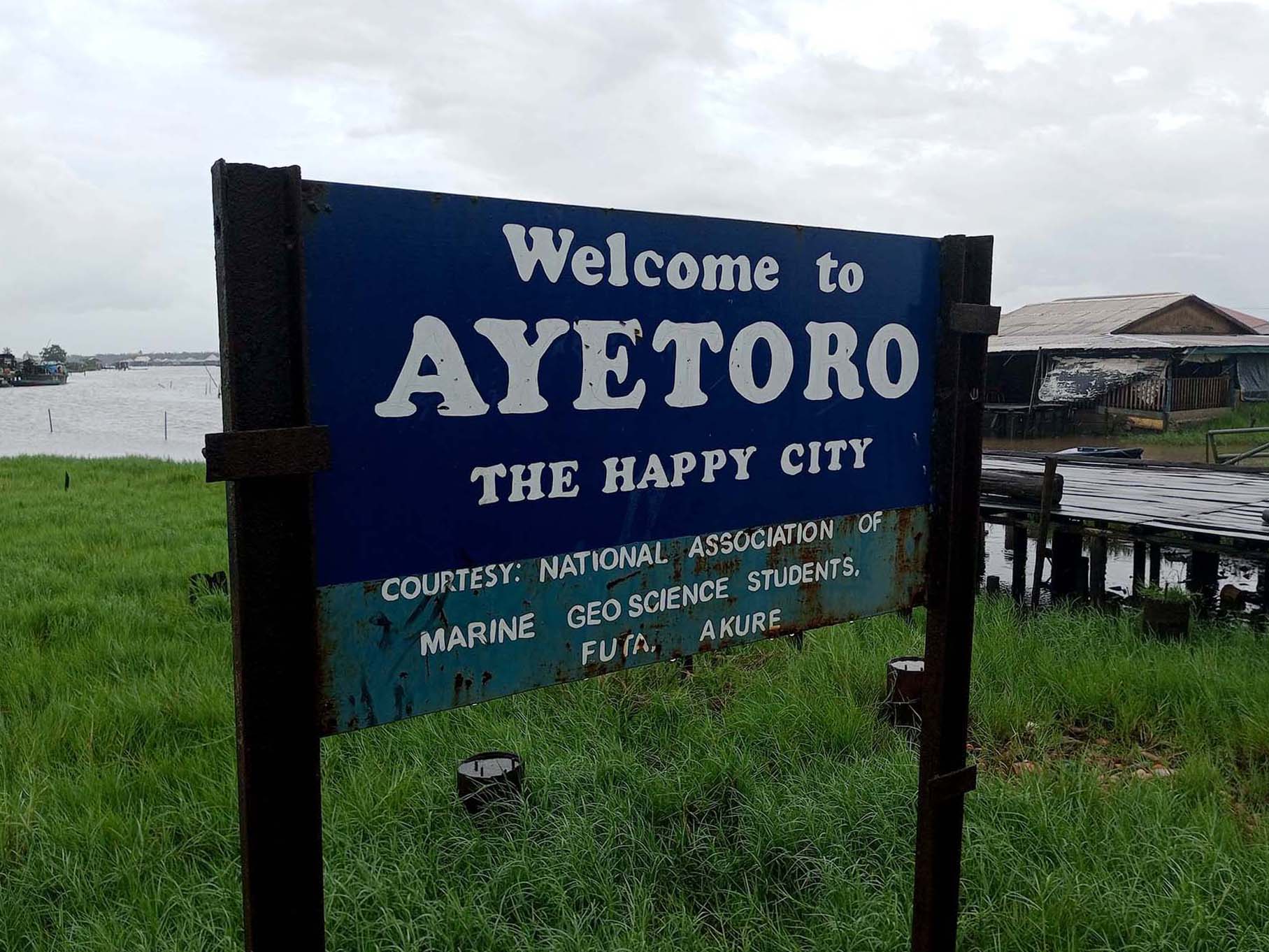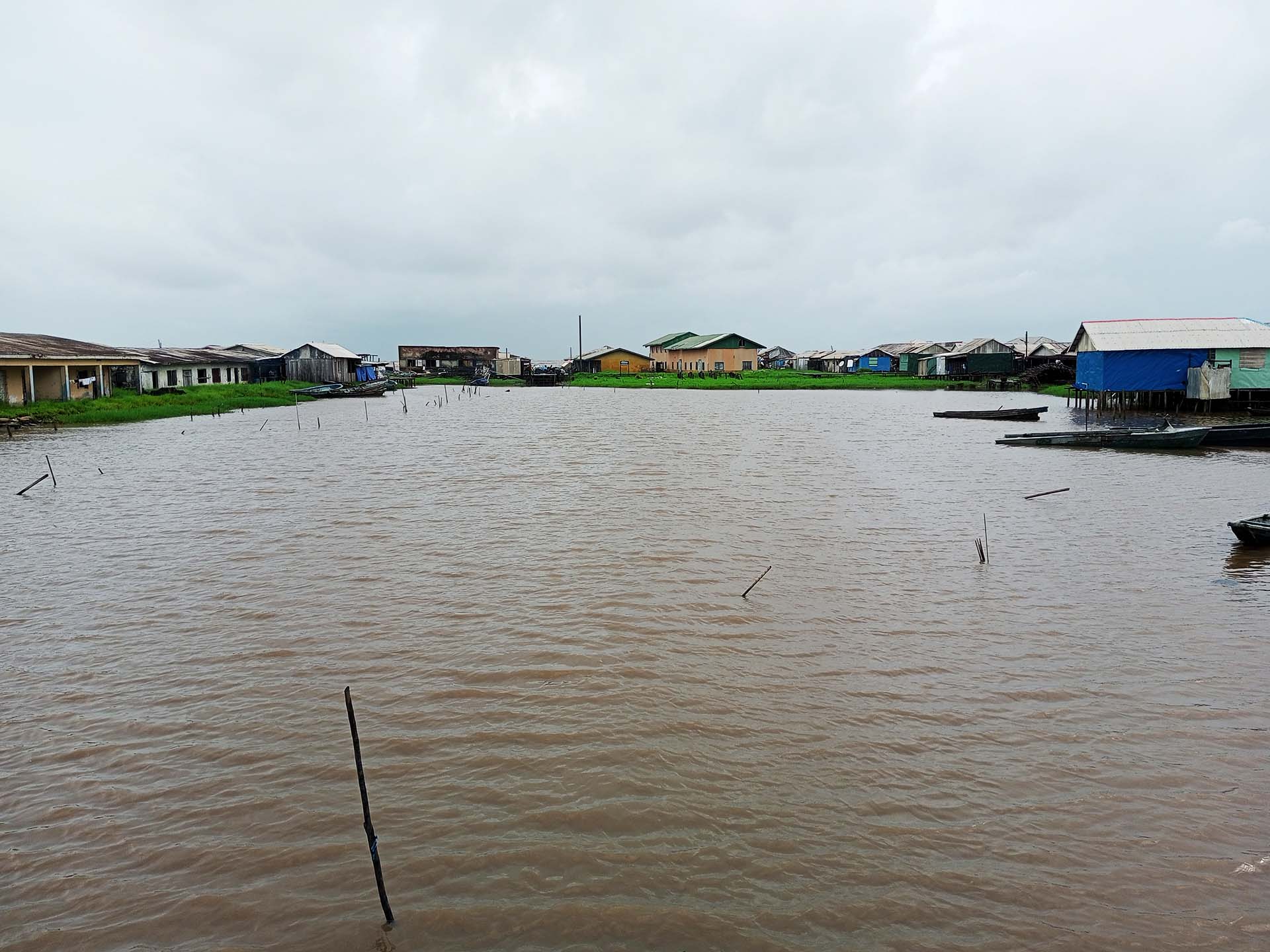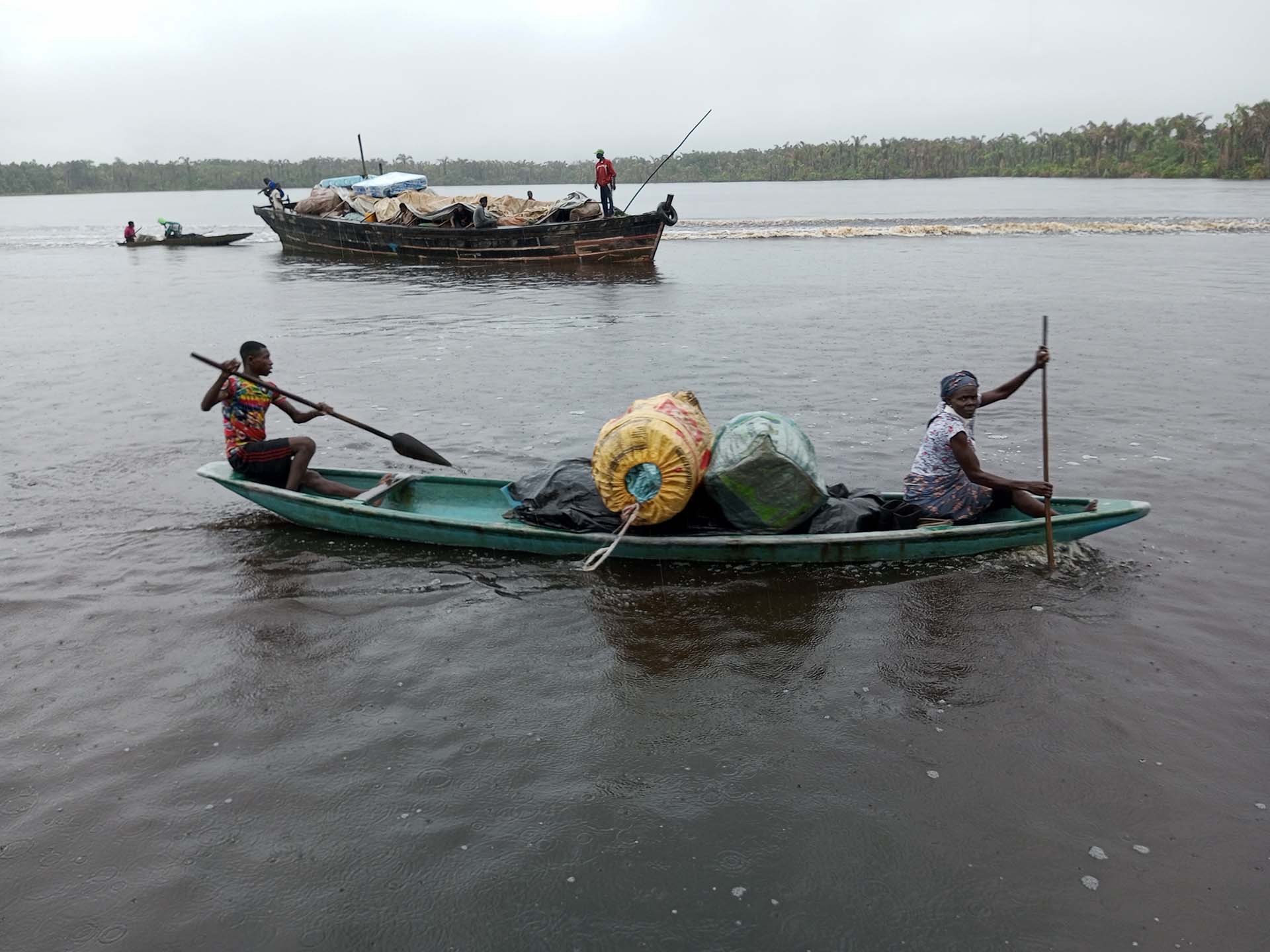Ayetoro battles rising seas and oil spills

Ayetoro, a vulnerable coastal community in Nigeria, is facing the impact of rising seas – as witnessed through a recent storm surge that destroyed many houses – and polluting oil spills. With a profound cultural heritage rooted in fishing, their livelihoods are at stake.
Traditional fishing canoes dot the coastline of Ayetoro, a town on the Atlantic coast of Nigeria. The sight of weatherworn fishermen returning with their day's catch evokes a sense of hardwork and resilience.
With its thoughtfully planned streets and visually pleasing residences, Ayetoro looks picture perfect. But a closer look reveals skeletons of buildings ravaged by the sea. Beneath the town’s idyllic surface lies a tale of hardships and resilience.
Rising seas, exacerbated by the detrimental effects of oil exploration, are pushing Ayetoro to the brink of extinction.


Left: a sign board at Ayetoro, known as ‘happy city’, welcoming visitors. Right: the sea that supports their livelihood is also proving to be a threat to the Ayetoro community. Photos: Samuel Ajala
Is Ayetoro losing the ‘happy city’ tag?
Established in 1947 by a church sect of the Ilaje people as an utopian settlement, Ayetoro in Yoruba language spoken in West Africa means ‘happy city’. Ayetoro humbly embraces its customs, traditional festivals and folklore, which serve as gentle threads that weave together the tapestry of its cultural identity.
Known for the community’s unwavering warmth and hospitality, and celebrated for its profound cultural heritage primarily shaped by the Ilaje people, it was indeed a happy place for its 10,000 inhabitants.
But the coastal community’s happy world turned upside down when a storm surge hit the town on 19 April 2023, engulfing homes and neighbourhoods. Hundreds of residents living closer to the coast had to flee their homes.
Morayo Babatunde, who has called Ayetoro her home for the past 35 years, tragically suffered a miscarriage while struggling to escape the encroaching waters.
In late 2020, a similar storm surge resulted in 2,000 individuals being displaced. The community now fears losing their battle against the rising seas.

The rise in sea levels
The rise in sea levels poses a significant threat to coastal communities worldwide. Since 1880, the average sea level has increased by 210-240 millimetres, with the past few decades accounting for a third of that rise. Warming oceans contribute to this phenomenon through the expansion of water volume.
In Nigeria, up to 41 million people reside in climate-vulnerable regions. And it is estimated that between 27 and 53 million people may need to relocate by the end of the century due to a projected 0.5-metre rise in sea levels.
"The melting glacier contributes to the rising sea level, which led to the devastating coastal flooding experienced in the Ayetoro community. The industrial activities of the oil-producing companies lead to CO2 emissions, which destroy the ozone layer and further lead to rising temperatures, increasing evaporation and glacier melting," said Ogunwumi Taiwo, a flood risk specialist in Nigeria.
By the turn of the century, some low-lying coastal cities currently inhabited by 200 million people could permanently fall below the high tide line, according to a study by Climate Central, an organisation that researches and communicates climate science.
A study conducted in 2012 by the University of Plymouth in the UK revealed that even a rise in sea level of 1-3 metres would have a catastrophic effect on human activities in Nigerian coastal regions. Even with a minor rise, the residents of Ayetoro are already feeling the impact.


The recent storm surge has destroyed many buildings. Photos: Samuel Ajala
Loss of homes
Babatunde’s personal loss was compounded by the loss of her house, shop and the shop’s goods worth millions of naira, the Nigerian currency.
"It was a heavy loss since I had bought goods from the market only that day. We lost my father’s house also," she said. "We had no time to bring anything to safety. Everything inside our house ended up inside the sea."
Omogoriola Ajinde, the chief justice of Ayetoro, shared a similar story. He recounted the loss of his own house and the destruction of ten neighbouring houses, leaving their occupants displaced. The entire community faces dire living conditions, with overcrowded spaces and a lack of adequate housing.
"My father's house, my house, the new house we had just built, and my father's shop were all destroyed. It's hard to put a monetary value on the losses because we had invested a substantial amount of money for the new house. The cost of building materials and labour, including the plumbing and electrical work, amounted to millions of naira. We have suffered significant financial losses," said Oluremi Ajayi, another resident.
Without a place of their own, Ajayi, her husband, three children and her father, are currently residing with a family friend in a one-bedroom apartment.
When Babatunde’s children fell ill, she could not get them treated, since she had lost everything at home to the storm surge and had no resources.

Loss of livelihood
Rising sea levels have led to the salinisation of the community’s farmland and water sources. Ajayi used to cultivate plantain, yam and other crops. But salinity has rendered her farm uncultivable.
The community also grapples with ground fissures caused by oil exploration, exacerbating the situation further.
With a deep-rooted connection to the sea, fishing is the primary livelihood of the Ayetoro community.
When oil exploration began in the seas after its discovery in the 1970s, the community was happy as they thought that it would bring socioeconomic development. But it has only exacerbated the problem, with oil spillage affecting their livelihood.
With siblings who are fishers, Ajayi also learnt to fish, and used to catch sagoro, a type of crayfish.
"Oil spillage killed the fish in the ocean and polluted our farmland, resulting in a loss of livelihood. Sagoro is no longer available in the sea. So I have stopped fishing," said Ajayi.
Orjiakor Maxwell, a geophysics expert and member of the Society of Exploration Geophysics and National Association of Petroleum Exploiters, agreed that oil spills affect different fish species differently.
"Oil spills can have a significant impact on certain fish species, particularly those that live near the surface of the water. Certain fish species are more vulnerable to oil spills than others. The impact of an oil spill depends on various factors such as the species, life stage, and the type and amount of oil spill," said Maxwell.
Ajayi buys other fish and dries them. Instead of selling fresh catch of sagoro, she has resorted to selling dry fish.
"Some fish species that are particularly vulnerable to oil spills include herring, salmon and cod. These are important commercial and recreational species and their populations can be significantly reduced due to oil spills. Additionally, oil spills can also impact the food chain and marine ecosystem as a whole," said Maxwell.



Skeletons of buildings stand witness to the storm surge that entered Ayetoro and destroyed everything in its wake. Photos: Samuel Ajala
Need for government intervention
Babatunde's plea for government intervention resonates with many in Ayetoro. She expressed the urgent need for support, particularly children’s education, since residents are using the money meant for their children’s schooling to overcome the losses suffered due to sea incursions.
According to Ajinde, when the storm surge occurred, the government provided clothes and food. However, he lamented that a contract awarded as far back as in 2007 to mitigate the impact of rising sea levels remains incomplete.
Ewa Henshaw, former chairman of the Niger Delta Development Commission (NDDC), had mentioned before the senate in 2014, that the commission had 4,000 abandoned projects scattered across the oil-rich Niger Delta region. The coastal protection measures in Ayetoro are among these abandoned projects.
"The waves are relentless and destructive. If the government could dredge and build embankments to prevent further damage, it would be a significant step," said Ajinde.
Officials at the Ministry of Environment were not available to comment about the government’s plans to mitigate the effects of rising seas and protect Ayetoro.
Solution to sea incursion
To address the recurrent sea level rise and sea incursions, Taiwo suggested protecting the coastline of the Ayetoro community with flood defences. He recommended implementing measures such as levees, dikes and seawalls to safeguard the coastline from rising seas. He highlighted the Netherlands as an example of a country that has successfully reduced coastal flooding through the construction of standard dikes.
"Another measure is the development of coastal wetlands, which have been proven to serve as a buffer for storm surges. There is a need for coastal wetland restoration in the Ayetoro community and its surroundings," said Taiwo.
The flood risk expert advised utilising digital technologies, including artificial intelligence, geographic information systems (GIS) and remote sensing, to model future sea level rise and storm dynamics. He stressed the importance of an early warning system that can provide real-time information to the community.
Additionally, Taiwo suggested revisiting delayed contracts for ocean dredging and shoreline protection, and seeking funding from international organisations to facilitate necessary projects, so as to save the Ayetoro community from extinction.






Member discussion